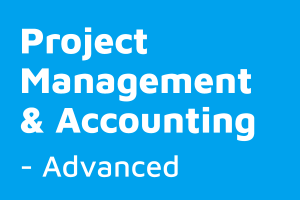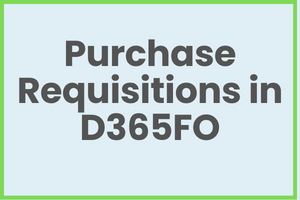Description
5-day live online MB-700 exam prep course.
The delivery is per our Prepare-Participate-Practice (3P) methodology.
What you get
- Welcome email to students
- Link to Dashboard in AXcademy – one-stop for all information
- Overview of courses
- Links to live sessions
- Prepare materials
- Live recordings and presentations used
- Practice exercises
- Link to Dashboard in AXcademy – one-stop for all information
- Preparation materials
- Videos, presentations, et al.
- Participate
- Live sessions – 5 days each with 2 x 3-hour live sessions
- Recorded live sessions (accessible for 30 days after the course)
- Presentations used
- Practice materials
- Hands-on exercises, deep dive documentation, et al.
- Standard MB-700 VM (D365FO training environments/sandboxes with standard “Contoso” demo data) is provided by AXcademy for each student
- access for 180 days.
Curriculum MB-700 Apps Solution Architect
Architect solutions
Gather requirements
- Identify operational and organizational challenges that may affect a business
- Identify existing business processes and opportunities to optimize business processes
- Gather information about expected transaction volume
- Categorize business requirements and perform gap fit analyses
- Review and validate business requirements throughout the solution lifecycle
Define the solution architecture
- Map business requirements to functional components
- Evaluate whether to build versus buy for selected business requirements
- Identify opportunities to implement supplemental Microsoft technologies
- Use the appropriate implementation tools including Lifecycle Services (LCS) and Azure DevOps
- Describe the Success by Design framework
- Create solution architecture diagrams
Define and document the solution blueprint
- Define an organization including company information, locations, and structure
- Document the implementation timeline including roll-out strategies
- Define the business process catalog and document solution gaps
- Define instances, environments, and solution components
- Identify required security roles
Define solution strategies
Select a deployment strategy
- Develop a process to manage solution code and deployment
- Select a deployment model and identify instances and environments required for the selected deployment model
- Describe the One Version strategy for Dynamics 365 and the effects of One Version on solutions
- Segment solution development and delivery into logical phases
- Provide alternative methodologies and approaches for deploying modifications
- Determine solution maintenance cadence and timelines
- Identify upgrade scenarios and select appropriate tools
Define an application lifecycle management (ALM) strategy
- Define a code management and data flow strategy
- Define a Microsoft Power Platform solution management strategy
- Determine which build automation capabilities to implement
- Define a roll-back strategy for solution code and data
Determine a data management strategy
- Differentiate between transactional and historical data
- Define data quality and data validation process
- Define data cleansing and transformation strategies
- Define data dependencies
- Develop a data migration strategy for master, transactional, reference, parameter, and document data entities
- Develop data cut-over, verification and data retention plans
Define the security architecture
- Differentiate between Azure, Dynamics 365, and infrastructure security
- Describe Azure and infrastructure security-related elements
- Describe use cases for and capabilities of record-level and role-based security in Dynamics 365
Define the integration architecture
- Select an integration pattern including OData, Microsoft Power Platform integration, Batch Data API, customer service, external web services, and office integrations
- Identify required integration and interface details
- Design integrations
- Define an integration testing strategy
Define the business intelligence and reporting architecture
- Gather business intelligence and reporting requirements
- Define data sources required to meet business intelligence and reporting requirements
- Select appropriate business intelligence and reporting tools including Power BI, organizational workspaces, financial reports, SQL Server Reporting Services (SSRS), and the Electronic Reporting tool
- Define printing requirements including, Document Routing Agent (DRA), modern report design layout templates, check printing, and label printing
Manage implementations
Describe Lifecycle Services (LCS) tools
- Understand the use cases and capabilities of different LCS tools
- Understand the use cases and capabilities of Business Process Modeler (BPM)
- Understand the use cases and capabilities of LCS Methodologies
- Create a usage profile to describe current or projected usage
Manage interactions with FastTrack
- Identify the value proposition for FastTrack
- Identify FastTrack engagement types and personnel roles
- Describe typical types of FastTrack workshops and the inputs for each workshop
- Describe go-live checklist elements
Determine support options
- Develop a support plan and strategy
- Define post-go-live support plans including response times and service-level agreements (SLAs)
- Describe use cases and capabilities for the LCS Support tool
Determine licensing requirements
- Determine the types of licenses required
- Estimate the number of licenses required by using the License Sizing estimator
- Describe the process for estimating ongoing software licensing costs
Manage testing
Define a testing strategy
- Define a testing strategy that includes all required types of testing
- Define a regression testing strategy
- Identify opportunities for automated testing
- Review use cases and test coverage for business scenarios
- Determine when to use RSAT, SysTest, Postman, ATL, Azure DevOps Test Plans, and other tools
Define a performance testing strategy
- Define performance goals and requirements
- Identify performance monitoring and testing tools
- Define performance benchmarks and success criteria
- Design a performance and load testing strategy
- Troubleshoot performance issues




Reviews
There are no reviews yet.